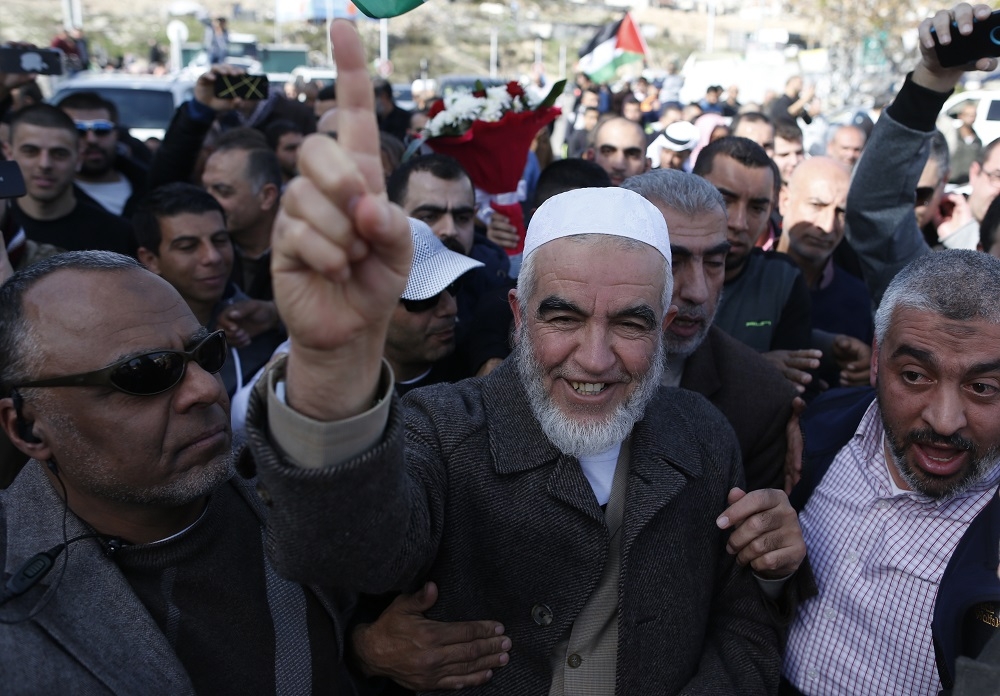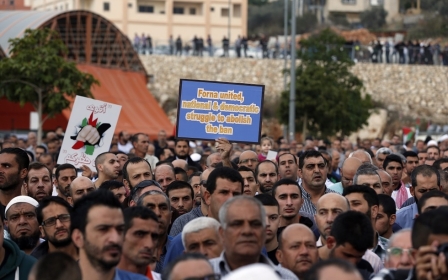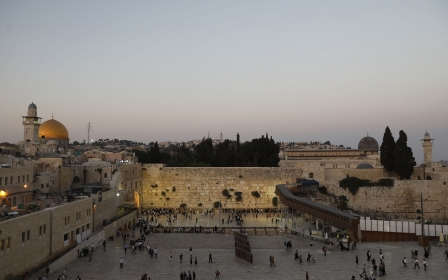Islamic Movement chief arrested in wake of al-Aqsa violence

Israeli-Palestinian cleric Raed Salah, the head of the northern branch of the Islamic Movement, was arrested in the early hours of Tuesday morning, according to a statement released by Israeli police.
The cleric has been repeatedly accused of inciting violence over a sensitive Jerusalem holy site where tensions again flared last month.
Salah was arrested in a raid on his home in the northern Israeli city of Umm al-Fahm, where witnesses told Israeli media that a large force of police arrived at about 3am.
Police said "a central instigator" of the northern branch of the Islamic Movement, which is banned in Israel, was arrested on suspicion of incitement to violence, terrorism and support for a banned group.
It was not clear whether the accusations were linked to last month's deadly unrest surrounding the holy site, which includes the revered al-Aqsa mosque and the Dome of the Rock.
Ongoing al-Aqsa tensions
Salah has led the campaign seeking to protect al-Aqsa amid claims that Israel intends to change the status quo at the contested site. Israel denies the claims, which were at the centre of last month’s violence at the site.
The violence erupted in and around the compound after three Arab Israelis shot dead two Israeli policemen on 14 July.
Salah, who was banned from visiting the UK in 2011, was released from prison in January after serving a nine-month sentence for incitement to violence over a 2007 sermon.
The northern branch of the Islamic Movement, a political and outreach organisation which says it is dedicated to supporting Israeli Muslims, was banned in November 2015 amid claims it colluded with "terrorism" and was a "sister movement of the Hamas terrorist organisation".
Israeli officials also said it had incited violence linked to Jerusalem's Haram al-Sharif mosque compound, known to Jews as the Temple Mount.
However, at the time of the ban Prime Minister Benjamin Netanyahu was accused of making "an entirely false comparison between the Islamic Movement and the most violent armed Islamic groups".
Salah was arrested in Umm al-Fahm, one of the largest communities of Israel's 1.7 million Palestinian citizens, a fifth of the population. It is home of the northern branch of the Islamic Movement, led by Salah, and was home to the three men who killed two Israeli policemen at al-Aqsa.
The gunmen evidently had the support of many in Umm al-Fahm
- Moshe Arens, former Israeli minister
That attack prompted a crackdown on access and the temporary installation of metal detectors and security cameras at the sensitive site.
For nearly two weeks, worshippers refused to submit to the checks and staged mass prayers in surrounding streets.
Ensuing protests and clashes left seven Palestinians dead, while three Israelis were fatally stabbed by a Palestinian assailant.
The shockwaves are still reverberating from that incident and are being felt most keenly in the town of Umm al-Fahm.
Last month Moshe Arens, a former minister from Netanyahu's Likud party, told Haaretz: "The gunmen evidently had the support of many in Umm al-Fahm, and others seem prepared to follow in their footsteps."
Showing solidarity
However Yousef Jabareen, a member of the Israeli parliament who is himself from Umm al-Fahm, told MEE that such accusations were unfair.
"People in the town were angry that the bodies had been kept from burial in violation of Muslim custom for two weeks."
"There are just a few extended families here, so many people wanted to show solidarity with their relatives, even though they reject the use [of] violence in our struggle for our civil rights."
Muhammed Barake, a former MK who heads a group representing Arab citizens in Israel, said that the arrest was an attempt to deflect attention from Netanyahu’s corruption case.
“We are not surprised of the brutal arrest of Salah, since the Aqsa crises we have witnessed a big incitement campaign that has targeted him, and the city of Umm al-Fahm.
“It’s also clear that Netanyahu is trying to draw attention away from his corruption case and he wants the media to be confused and to be busy with issue such as this.”
The Islamic Movement was founded in the 1970s and is popular with many Israeli Muslims as it runs social services, including health clinics, mosques and a sports league. The movement split between the more moderate southern branch and northern branch in the mid-1990s.
The group reportedly rejects the Oslo peace accords and boycotts national elections on the grounds that they give legitimacy to Israel's institutions.
Middle East Eye propose une couverture et une analyse indépendantes et incomparables du Moyen-Orient, de l’Afrique du Nord et d’autres régions du monde. Pour en savoir plus sur la reprise de ce contenu et les frais qui s’appliquent, veuillez remplir ce formulaire [en anglais]. Pour en savoir plus sur MEE, cliquez ici [en anglais].




